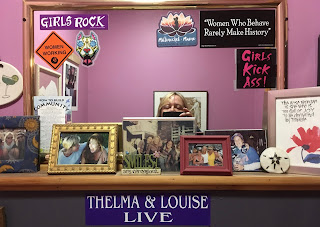So much more connects us than divides us.
Like...water. Water divides our continents, our states, our cities, our nations. And it connects us. Not only does it run through our places and our planet, it runs through our cells.
Cuban-American pianist Arturo O’Farrill reminded us of this last night during a free concert at @Bowdoin College here in Maine that I was highly privileged to attend. Sharing space in the same room with these fantastic Afro-Latin musicians and the audience was, as O’Farrill noted, sacred. One of the finest parts of the evening was watching the musicians wordlessly communicate with each other on stage: their eyes. Their gestures. Their smiles. Their music. Their bodies. We were, briefly and for this one moment, never to be repeated, bodies together in that room. We were, briefly and for that one moment, breathing the same air.
O’Farrill is a soft-spoken, energetic, sweating teddy bear of a man, son of the great Cuban musician Chico O’Farrill and father to two successful musicians, Adam and Zack. We had the great pleasure of meeting and hosting the O’Farrill family when the boys were quite young for a week in Stonington when O’Farrill appeared at the Deer Isle Jazz Festival, as part of which he was in residence at Haystack Mountain School of Crafts. I chased him into the backstage elevator after last night’s concert, to be rewarded with a giant hug all the way down. #blessed
Arturo reminded us of all that we share in his brief comments between extended stretches of music. Music is a language, he said. It connects us to mother Africa and to each other, trans-migration, cross boundaries. He told us about a new project he had recently completed, a documentary of which is scheduled to appear this month: Fandango at the Wall, in which he gathered musicians on both sides of the wall between San Diego and Tijuana for a jam session that built upon son jarocho music: Veracruz sound, “a venerable 500-year-old Afro-Mexican musical tradition.”
“Sound is not stopped by a wall,” O’Farrill reminded us lightly. Later, he told us that at a concert in Washington, D.C., he was making similar comments and a woman in the audience told him that music and art should not be political. “But music has always been political,” Arturo said, again in his calm, mild voice. “All of jazz. Nina Simone. Folk traditions. We have always used music to communicate about what matters to us.”
You can come experience some authentic son jarocho music on March 19 in Portland, when Portland Ovations brings the Los Angeles bad Las Cafeteras to PortCity. Their enthusiastic style crosses musical borders, and will bring the world to Maine that evening, welcoming us all home here from wherever we may start.
O’Farrill’s 18 piece Afro-Latin Jazz Orchestra mixes players young and old and, despite its traditions, features three female brass players as well. With five saxophonists, four trumpets, one bass and three regular trombones, three percussionists, a bassist, and O’Farrill on piano the Jazz Orchestra finesses an amazing range of modalities, treading softly and sweetly on ballads prior to blowing the doors off the hall with the four trombonists coming to the edge of the stage to rock out a grand finale of New Orleans tradition in “Iko, Iko.”
Hey now. Hey now. How has art transformed YOUR heart and mind today?























